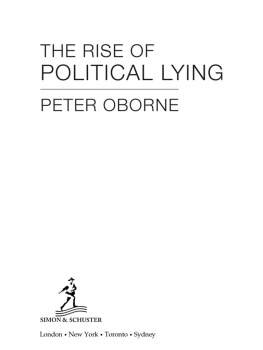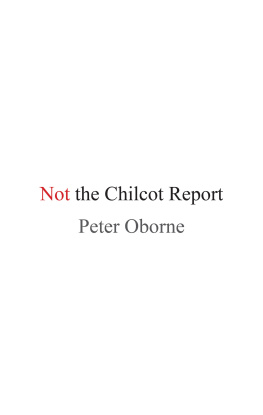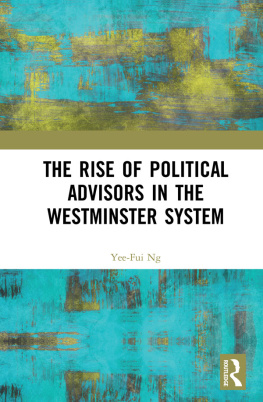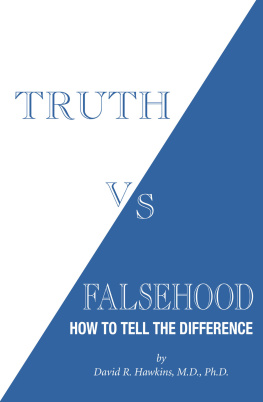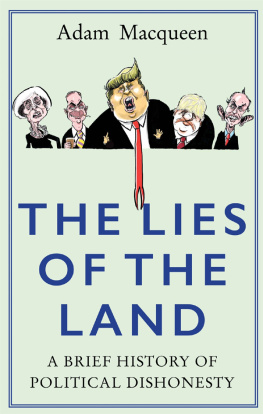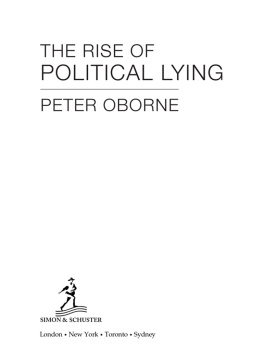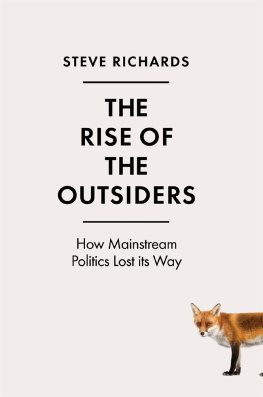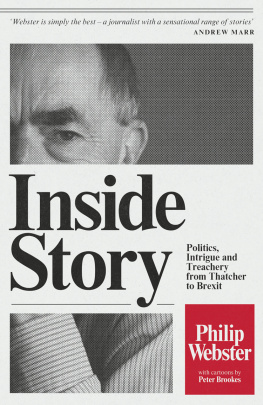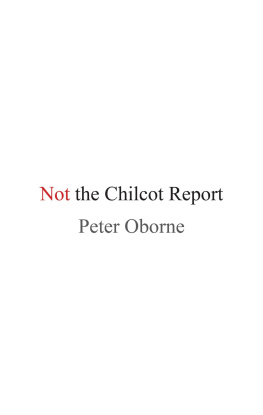THE RISE OF
POLITICAL LYING
Also by Peter Oborne
Alastair Campbell: New Labour and the Rise of the Media Class
Basil DOliveira: Cricket and Conspiracy
The Triumph of the Political Class
With David Morrison:
A Dangerous Delusion: Why the West Is Wrong About Nuclear Iran

To Martine
Acknowledgements
I have incurred overwhelming debts to hundreds of people while writing this book, so I feel guilty to mention only a few by name. My two researchers, Elizabeth Jones and Tom Greeves, have been immense. Elizabeth has been superb, keeping the show on the road and remaining calm at all times. Tom has proved an outstanding researcher and fact-checker. George Cazenove, James Frayne and Neil OBrien all did brilliant work towards this book. Tim Knox, Richard Ritchie and Samir Shah have all read and commented on long sections. John Morrison has shared with me his detailed knowledge and acute analysis of the Hutton Inquiry, and showed enormous generosity with his time and understanding. I have derived great enlightenment from discussing the philosophy of lying with Adam Pryce MP. David Morrison has shared his deep understanding of the Iraq War and its aftermath. Greg Rangwala has helped me greatly on British government dissembling during the build-up to the Iraq War. Andrew Sparrow, historian of the parliamentary press gallery, has shared his observations about the techniques used by British politicians to avoid telling the truth. Boris Johnson, editor of the Spectator, generously allowed me to go on sabbatical as well as providing instruction about Greek philosophy. Veronica Wadley, editor of the Evening Standard, also very kindly allowed me to suspend my weekly column. Thanks are also due to the Observer and the Independent for their generous permission to publish two articles by the late political journalist Tony Bevins about Tory lying. My publisher Andrew Gordon and agent Gill Coleridge have been great. Finally, my thanks go out to my wife and children, who have paradoxically seen both too much and too little of me during the time this book was written. All failures of fact, understanding or analysis remain, of course, my own.
THE RISE OF
POLITICAL LYING
INTRODUCTION
Our job is to create the truth Peter Mandelson
On 2 December 1997 the government minister Peter Mandelson gave evidence to MPs on government plans to celebrate the millennium. He dismissed critics of the proposed Dome, maximised its advantages, and unveiled an amazing new feature. Mandelson boasted that it would be vast, huge in scale. He divulged few details but described it as an interactive attraction which comes under the working title of Play at Surfball: The New Twenty-First Century Sport.
Newspapers enthusiastically reported the news. The Times stated that Mr Mandelson offered the committee a glimpse of the Domes attractions. The most exciting entertainment would be an interactive computer game called Surfball, which he described as the sport of the twenty-first century, and a fifteen-minute roller-coaster ride.
The following week Peter Mandelson was banging the drum again for Surfball. The contents of the millennium experience, the Dome, will attract people of all ages, he told MPs on 8 December, although I expect that playing Surfball, the twenty-first century sport, will have an especial appeal to young people.
However, the government was coy about revealing further details of the new sport. When MPs asked Jennie Page, chief executive of the New Millennium Experience Company about Surfball, she told them they were asking for commercially confidential information which the company proposes to keep to itself for some time yet.lend itself to international competition? Would it offer possibilities for career development in coaching and management? Heller received an arch reply from Peter Mandelsons private secretary, Rupert Huxter, urging him to curb his impatience until the Dome opened.
The mystery began to intrigue Labour MP Austin Mitchell. Egged on by Richard Heller, he put down parliamentary questions demanding how much had been spent on it, what rights had been acquired and who had been consulted. Only at this point (8 May 1998) did Mandelson come clean. Surfball was a working title, he imperturbably declared in a written parliamentary answer, used for illustrative purposes at the end of last year when design proposals were at a very early stage... The New Millennium Experience Company does not intend to seek to register the name Surfball for any games or features which may form part of the content of the Serious Play Zone. In due course Stephen Bayley, after resigning as creative director of the Dome, revealed the true origins of Surfball. It was invented by a hard-pressed team of consultants making a pitch to the New Millennium Experience Company: Engaging the higher cerebral functions for only a fraction of a second, one of their number came up with Surfball, an apparently new coinage whose components hinted at a combination of the Americanisms so admired by New Labour together with gruffly proletarian reference to a round plaything.
During its brief but dramatic career, the sport of Surfball was announced in parliament, praised by MPs and written up by journalists. But it never existed. Nevertheless it has its own significance. It is a comparatively early instance of our new public domain, where truth has become indistinguishable from falsehood.
Public statements are no longer fact based, but operational. Realities and political narratives are constructed to serve a purpose, dismantled, and the show moves on.
This is new. All governments have contained liars, and most politicians deceive each other as well as the public from time to time. But in recent years mendacity and deception have ceased to be abnormal and become an entrenched feature of the British system. This book will show that the rise in political lying as a systemic phenomenon began with the last Tory government, but reached its current fully developed form as the result of the emergence of New Labour.
In 1979, in his famous essay on The Power and the Powerless the Czech playwright and future president Vaclav Havel described how it felt to live within a totalitarian system of government, with a world of appearances, a mere ritual, a formal language deprived of semantic contact with reality and transformed into a system of ritual signs that replace reality with pseudo-reality. Britain is still a democracy, though no longer an especially healthy one, and there are disturbing echoes of Havels nightmare analysis in our own deceitful public discourse. By no means all inventions are as harmless as Peter Mandelsons Surfball. In 2003 Britain went to war on the back of a fiction: the proposition that Saddam Husseins Iraq possessed weapons of mass destruction. It did not, but tens of thousands of people died as a result.
This book comes in three parts. Part One, incorporating Chapters 14, will present much of the empirical evidence, and thus help to demonstrate the awesome scale of the problem. Part Two, Chapters 58, examines the philosophical, cultural, social and political reasons for the emergence of dissimulation as a defining feature of modern British political culture. The final chapter of this section takes account of the lies told before, during and after the Iraq War of 2003. It shows that these did not come about by chance, but were the inevitable result of the British method of government at the start of the twenty-first century. Part Three analyses the debilitating consequences of our new public mendacity, and then proposes some radical solutions. This section includes an examination of the role of the broadcasting media and the press, so often the vehicle, and to some extent the cause, of government mendacity.
Next page
